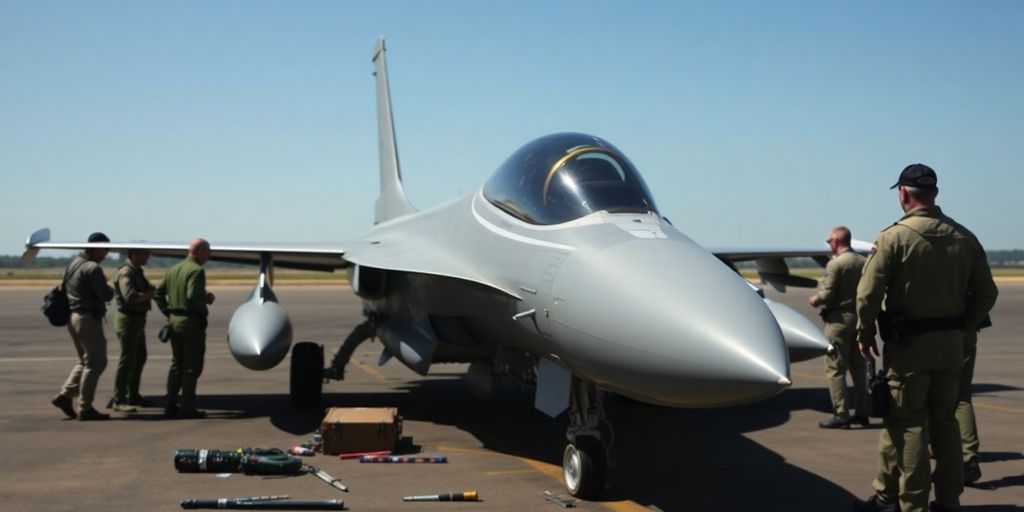Bulgaria’s first F-16 Block 70 fighter jet has been grounded due to technical issues detected during its acceptance testing, sparking allegations of sabotage and political controversy. The situation has raised concerns about the security of sensitive military systems and the integrity of defense procurement processes in the country.
Key Takeaways
- The F-16 Block 70 was grounded after a system deviation was identified during acceptance testing.
- Allegations of sabotage have emerged, prompting a parliamentary investigation.
- Defense Minister Atanas Zapryanov has dismissed sabotage claims as politically motivated.
- The aircraft is crucial for Bulgaria’s military modernization and NATO integration.
Technical Issues With The F-16
The F-16 Block 70, delivered by Lockheed Martin, was officially welcomed in Bulgaria on April 13 and arrived at the Graf Ignatievo air base on April 2. However, shortly after its arrival, a system deviation was detected, leading to its grounding. Major General Nikolay Rusev, the Air Force Commander, confirmed that the aircraft is undergoing a two-phase acceptance process, which includes technical and flight evaluations.
- Acceptance Process:
- Technical evaluation
- Flight evaluation with a Bulgarian pilot
Rusev emphasized that the detection of a system deviation does not imply that the aircraft is defective, but it must be resolved before the jet can be operational.
Political Fallout
The grounding of the F-16 has ignited a political firestorm in Bulgaria. Former Prime Minister Boyko Borissov has accused President Rumen Radev of suggesting that the aircraft is not operational, leading to calls for the dismissal of the Air Force Commander if these claims are substantiated. This has prompted a parliamentary committee to hold hearings regarding potential unauthorized access to classified information and possible sabotage.
- Key Political Figures Involved:
- Boyko Borissov: Former Prime Minister, GERB party leader
- Rumen Radev: Current President
- Atanas Zapryanov: Defense Minister
Allegations Of Sabotage
The controversy has escalated with allegations that foreign intelligence may have interfered with the aircraft’s systems. Some political analysts have suggested a possible Russian connection, questioning how the aircraft could have flown 9,000 km without issues only to encounter problems upon landing in Bulgaria. However, Defense Minister Zapryanov has firmly rejected these claims, labeling them as absurd and politically motivated.
- Statements from Officials:
- Zapryanov: "There is no sabotage. The claims are completely unfounded."
- Rusev: "The aircraft will fly when we are ready to operate it. This takes time."
Future Implications
Despite the current issues, the F-16 Block 70 is a vital component of Bulgaria’s military modernization efforts and its integration into NATO defense structures. The country is set to receive a total of eight F-16s by the end of 2025, with ongoing training programs and infrastructure development at the Third Air Base.
- Delivery Timeline:
- First aircraft: Delivered April 2025
- Total aircraft expected: Eight by end of 2025
As the investigation unfolds, the Bulgarian government faces the challenge of maintaining public trust in its defense capabilities while addressing the technical and political complexities surrounding the F-16’s acceptance into service.
Sources
- Bulgaria’s Missing Euro Debate, Jacobin.
- Bulgaria grounds first F-16 Block 70 jet due to system deviation during acceptance testing, Defence Industry Europe.
- Bulgarian parliamentary committee to hold hearing on F-16 amid allegations of sabotage, attempted espionage –
The Sofia Globe, The Sofia Globe. - MPs in Sofia suspect sabotage of first Bulgarian F-16, Euractiv.
- Bulgaria Rejects Claims of Sabotage at Air Base Over F-16 Issues, Defense Mirror.






